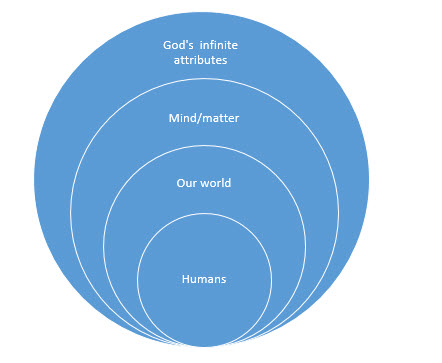Something Can’t Come from Nothing
In the first twelve propositions of Ethics Spinoza establishes God and the nature of God as necessary truths which form the “ground” or foundation for his whole philosophy. In simple terms, he is saying that “Being” has always existed because something cannot have emerged from nothing (Lord, 2010, p. 33). As a result of this reasoned precept, a number of “necessary” truths must inevitably arise. If we accept that something cannot come from nothing, we must accept that this something has always been there, and always will be there. This Being or what Spinoza calls “Substance” must be God since it fits Spinoza’s definition of God: an infinite, ever-changing, conscious Being. This “Substance” can theoretically be conceived of in an infinite variety of ways as existing, but we, as humans, can only conceive of God in two ways: as matter or physical “stuff” (what Spinoza and philosophers of his time like Descartes call “Extension”) and mind, what Spinoza terms “Thought”. These are the two “attributes” – or ways of conceiving — of God: Thought and Extension (Lord, 2010, p. 21). God was and is and will be everything.
What are the implications for a theory of learning of this ontological grounding for existence? There are a number of thoughts that spring to mind. First all learning is learning about God’s infinite essence; the different ways God expresses him/herself. Second, all learning is necessarily and infinitely “connected”. Ultimately, everything is “one”. Thus we can argue that “holism” – that notion that all knowledge is connected — forms both the ontological and epistemological framework for any Spinozist methodological framework for learning. (See Everything is Connected)
Journey into Joy
Research: Find out more about the Big Bang if you don’t know much about it. What do scientists say was in the universe before the Big Bang?
Learning Is Infinite
This is important; nothing is outside the remit of learning in a Spinozist pedagogy; nothing is ruled in or out. Since God is infinite, there are infinite possibilities, infinite modes for learning. (Spinoza, 1994a, pp. 7 P. 11, P. 16)
Journey into Joy
Shut your eyes. Listen.
Shut your eyes and feel your face, feel the skin of your face, your ears, the lids of your eyes, your hair, your neck, the backs of your hands, anything else you want to feel. Open your eyes. What did you think, feel and see when you did this?
We Are One
In a Spinozist universe, nothing is outside nature; we are all ultimately one; this includes both mind and matter. Thoughts are as much the products of nature as physical things are. Everything which exists physically has its corollary as an idea.

Journey into Joy
Group exercise: put your hand up to another’s person’s hand just close enough so that you can feel the warmth of their hand; now move your hand or respond to the other person’s hand moving but make sure you don’t touch, try to respond to the movement of the person’s hand by feeling their warmth. Do the exercise with your eyes shut once you’ve done it with your eyes open.
Have a go at a Mexican wave in a group.
Sing a song or a wordless tune in a group.
Reflections: what did you think and feel about doing these exercises?
Creative Visualisation. Shut your eyes and imagine the beginning of the universe; that 13.7 billion years ago, everything that is in the universe now was concentrated into one tiny point which exploded outwards in an unbelievably hot explosion; think how your blood, your skin, your brain, and all that you see and feel and smell and touch and taste in your life was once concentrated into that point. Feel the unspeakably hot explosion, and imagine it is inside you, and you are it.
Thought experiment(s). Imagine you have another “you”, a doppelganger, a double, who does whatever he/she wants. Describe this person. What do they do? How do they feel? What do they think? Now imagine, you could be another person as well, invent a “third” person, what do they do. Now imagine you are an animal. What animal are you? Why? Now imagine you are an living thing. What are you? Why? What do you think and feel? Now imagine you are an inert, “dead” object. What are you and why? Now imagine you are a planet. What kind of planet are you? What do you have on your planet? Why? Now imagine you are a galaxy. What kind of galaxy are you? Why? Now imagine you are a universe. What do you contain? Why?

